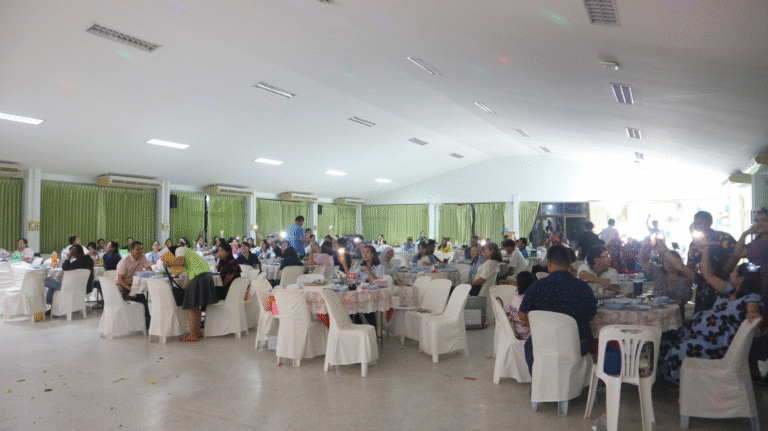Reporters: Dr. Wichulada Thavaroj, Ms. Panyaras Luekhajon, Asst. Prof. Rungtip Wuttanaworakit, Asst. Prof. Noppadon Podkumnerd, Asst. Prof. Jasada Romyen ,Mr. Jessada Montralak
Evidence Date: 25 January 2024
Related SDGs:

Related SDGs: 2.3.1
Related Indicators: Please put related SDGs indicators
Details: Supporting details and pictures
On 25 January 2024, students from the Nutrition and Dietetics major of the Food and Nutrition Program organized the outreach project “Integrating Nutrition Knowledge from the Classroom to Real-World Practice.” The initiative aimed to translate classroom learning into practical interventions to promote food and nutrition security among community members and students.
The objectives of the project were to enable students to:
- Integrate their academic nutrition knowledge into real-world health settings.
- Plan and solve problems related to food and nutrition security in practical situations.
- Develop critical thinking and professional skills while addressing community needs.
The main activities included:
- Nutritional assessment of community members.
- Providing nutrition education on balanced diets, healthy meal planning, and affordable nutritious food.
- Healthy cooking demonstrations, promoting accessible and nutritious meal preparation.
- Engaging with the local community to increase awareness of food security and healthy eating habits.
This student-led initiative reflects the university’s proactive approach to alleviating hunger and promoting nutrition awareness through community engagement.








Related Links:
Teaching and Learning
Title: Student Food Security and Value-added Agricultural Products Programme
Reporters: Dr. Wichulada Thavaroj, Ms. Panyaras Luekhajon, Asst. Prof. Rungtip Wuttanaworakit, Asst. Prof. Noppadon Podkumnerd, Asst. Prof. Jasada Romyen ,Mr. Jessada Montralak
Evidence Date: 3 October 2024
Related SDGs:

Related Indicators: 2.3.1
Details: Supporting details and pictures
The Faculty of Agriculture has implemented an ongoing programme to address student food insecurity by integrating food production, value-added product development, and practical business skills into the curriculum. This initiative allows students to access affordable and nutritious food while learning essential skills to generate income and reduce food insecurity on campus.
On 3 October 2024, as part of the course “Agricultural Product Management and Value Addition,” students transformed farm products from the faculty’s agricultural units including free-range chicken and organic vegetables into Chicken Burgers, a nutritious and affordable food option.
The programme includes:
- Practical training in food processing, safe handling, and product development.
- Utilization of agricultural produce from university farms, ensuring fresh and sustainable ingredients.
- Skill building in menu development, costing, and entrepreneurship to support student self-reliance.
- Access to low-cost food products made by students for students.
- Knowledge sharing by experts, including guest lecturer Asst. Prof. Narongchai Chupool, who provided advanced techniques and international perspectives.
This programme is a structured, recurring educational initiative that not only strengthens students’ food security but also builds skills in sustainable agriculture, nutrition, and entrepreneurship.




Related Links:
Teaching and Learning
Title: Practical Learning on Fish Freshness Evaluation and TVB-N Analysis
Reporters: Dr. Wichulada Thavaroj, Ms. Panyaras Luekhajon, Asst. Prof. Rungtip Wuttanaworakit, Asst. Prof. Noppadon Podkumnerd, Asst. Prof. Jasada Romyen ,Mr. Jessada Montralak
Evidence Date: 27 August 2024
Related SDGs:

Related Indicators: 2.3.1
Details:
Students from the Aquaculture Program at RUTS participated in a laboratory session focused on fish freshness evaluation and Total Volatile Base Nitrogen (TVB-N) analysis. The session, led by Asst. Prof. Supaewphan Lohalaksanadet, provided students with essential knowledge and practical skills in assessing the quality of aquatic products.
TVB-N analysis is a key indicator in determining the freshness and safety of fish and seafood products. By conducting hands-on experiments, students gained a deeper understanding of quality control procedures and learned how to apply scientific methods in real-world food safety and processing contexts.

Related Links:



